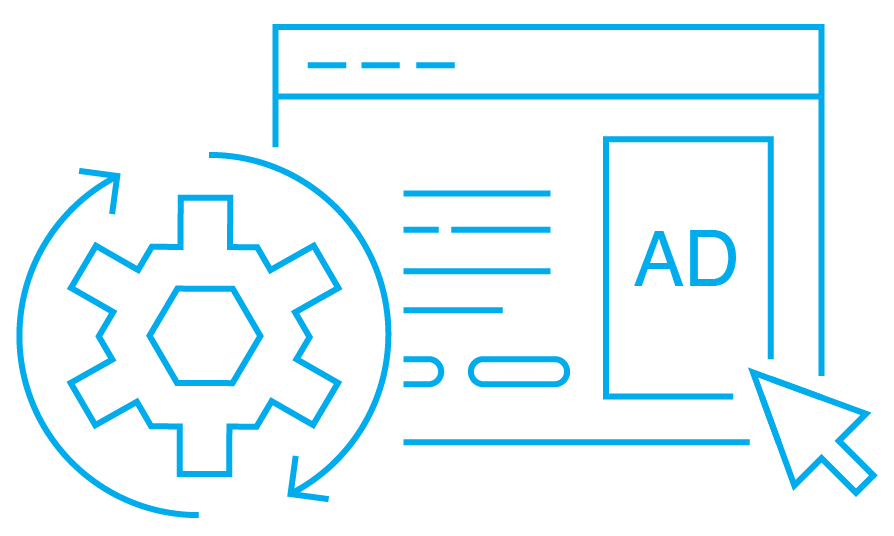- Data-driven marketing in the age of data
- Data-driven marketing definition
- Benefits of data-driven marketing
- Data and digital marketing
- DMPs: managing data-driven activities
Marketers use data to gain insights about customers, accurately target the right group and deliver personalized ads. When they make use of data for targeted media buying, audience analysis and ads tailored to clients’ needs – it is data-driven marketing.
Data-driven marketing in the age of data
We live in the age of data. Internet users generate more than 2.5 quintillion bytes every day. What’s more, consumer IP traffic is expected to reach 153,935 petabytes per month in 2019. The data can be chaotic but if it is used wisely, it is a precious knowledge for digital marketers. Armed with data they can boost the effectiveness of conducted campaigns and serve customers ads they expect.
Tech marketers see the value of information about customers. That is why global spendings for data is growing fast all over the world. In 2019 the global data market value will hit $26 B, according to “Global Data Market Size 2017-2019” report.
Data-driven marketing is developing because of a growing amount of data which lets advertisers prepare more precise campaigns. And digital-savvy customers expect personalized ads. So let’s take a closer look at what data-driven marketing really is.
Data-driven marketing definition
Data-driven marketing is a way to understand your audience through big data sets. By gathering and analyzing data, tech marketers gain insights about clients. They can use this knowledge to make optimal decisions and optimize marketing processes. In other words, data can tell marketers what clients expect, which online channel is the most effective or which ad formats perform the best.
The data help marketers to understand who are their clients and how to talk to them. These insights are really helpful in making more engaging campaigns that’ll catch the attention of the target group. But how marketers can benefit from the data-driven marketing?
Benefits of data-driven marketing
On the basis of data, marketers can make more accurate decisions and they gain valuable knowledge about their clients. We can distinguish four main benefits of data-driven marketing:
- More cost effective-media buying – knowledge about customers help marketers to choose specific websites to display the ads. By knowing their audience group, advertisers can invest only in media their audience visit. They don’t lose the budget by targeting a large audience group but reach out to the right users in the right place.
In other words, advertisers can spend budgets on displaying ads on websites tailored to audience interests. It almost always has a positive impact on campaign efficiency. What’s more, by using data can analyze the effectiveness of specific channels and move budgets to the best performing ones.
- Reaching out to the right audiences – by using data, marketers can deeply know users – their interests, demographics or purchase intentions. In programmatic advertising, marketers can choose a target group from global DSPs or create custom target audience. Accurate targeting brings better results and improves brand experience because users see ads tailored to their needs.
- Delivering personalized messages – this point is strongly connected to the one above. If marketers know the profile of customers, they can not only reach out specific audience but also create personalized ads.
For example, if marketers know that target users like classic cars, they can invite them to an exhibition of the old, classic vehicles and then promote their product. According to the Infosys study, 59% of shoppers who have experienced personalization believe it has a strong influence on purchasing.
- Better product development – data-driven decisions help marketers to choose more relevant product features and design things tailored to customers’ needs. By knowing age, interests or incomes of target group marketers can much easier create a more accurate product or set the price that clients can afford.
Data and digital marketing
Data is widely used in digital marketing, mostly in programmatic campaigns where it is used for targeting the right audience. It is the area of digital marketing that grows rapidly all over the world. According to our report, marketers will spend over $89.5 B on programmatic campaigns in 2019.
There are also loads of marketing and analytical tools that are using data. Well-known are, e.g. Google Analytics or Hotjar. Most tools for massive mailing use data to analyze the efficiency of campaigns, as well as social media, which use data to analyze the traffic, interactions or engagement.
DMPs: managing data-driven activities
A powerful technology that helps marketers manage all data they gather is Data Management Platforms (DMPs). It helps to collect, analyze and activate customer data on global DSP platforms to reach out to the precisely chosen audience with specific attributes.
To learn more about DMPs check our two articles:




